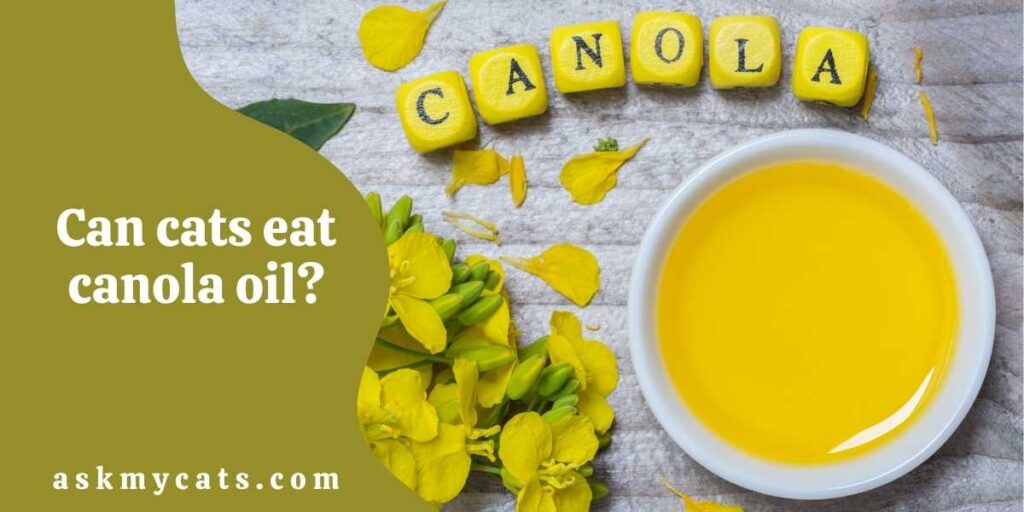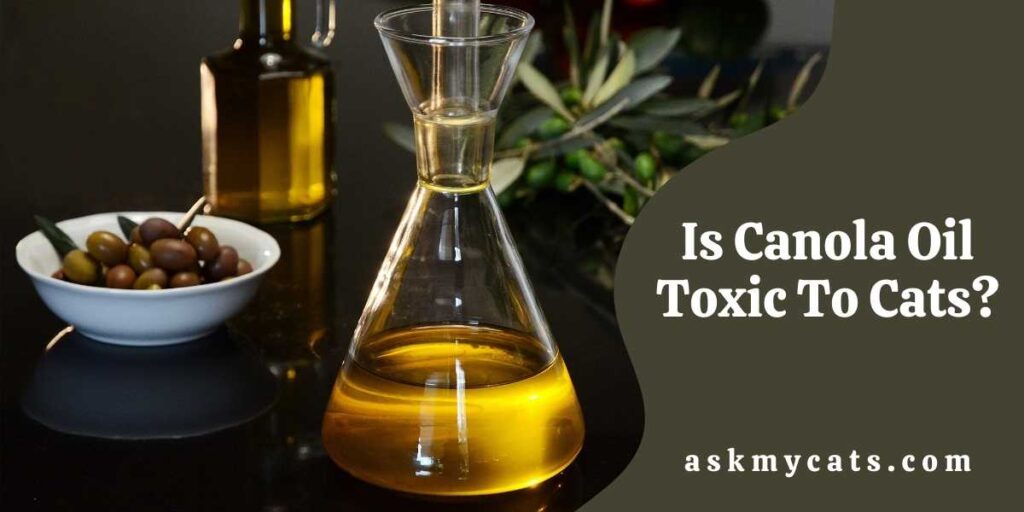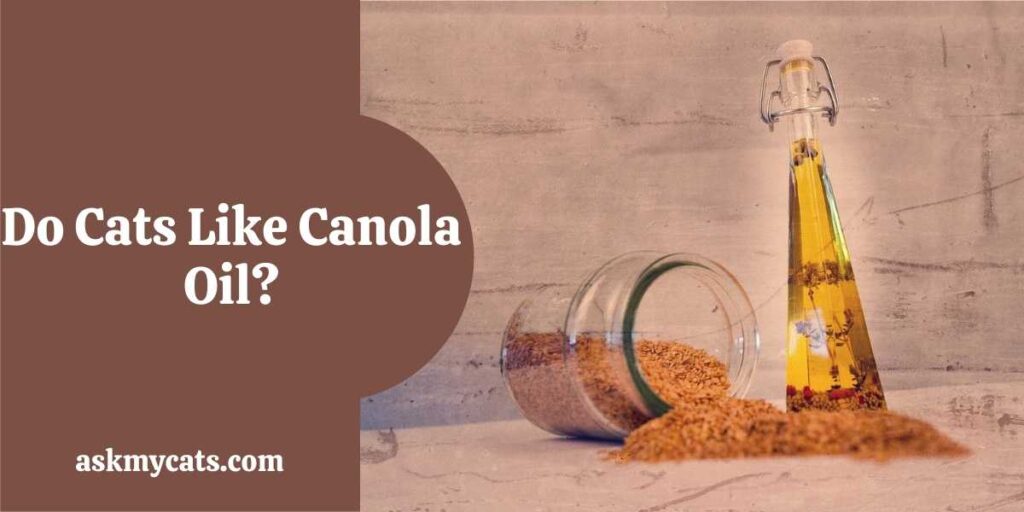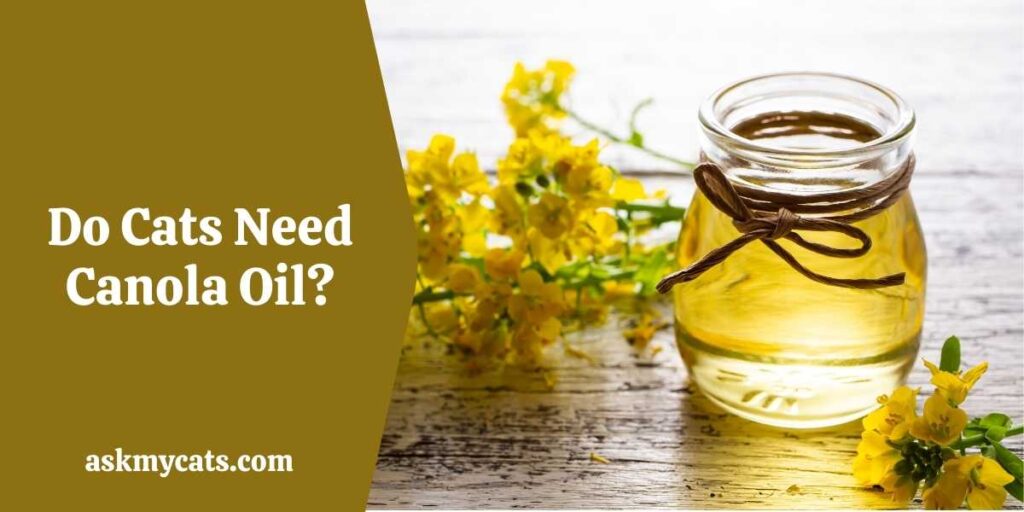Canola oil is an abbreviation for CANadian + Oil + Low Acid. It has a wide range of culinary applications, a high smoke point, and properties that may or may not be advantageous.
There are numerous professional opinions supporting and opposing canola oil as an appropriate addition to any diet, human or feline.
So, can cats eat canola oil?
Yes, cats can eat canola oil. However, it is advised not to feed it to them, as there has been no concrete study showing they are beneficial or entirely safe for them.
This article will tell you can cats eat canola oil and are there any benefits to it.


Give Your Cat the Perfect Day
Get the Free Ebook!
What Is Canola Oil?
Canola oil is a vegetable oil derived from a variety of rapeseed that is low in erucic acid, as opposed to colza oil. There are both edible and industrial forms produced from the seed of any of several cultivars of the plant family Brassicaceae.
The official definition of canola, according to the Canola Council of Canada, is “Seeds of the genus Brassica (Brassica napus, Brassica rapa, or Brassica juncea) from which the oil shall contain less than 2 percent erucic acid in its fatty acid profile and the solid component shall contain less than 30 micromoles of anyone or any mixture of 3-butenyl glucosinolate, 4-pentenyl gluco Canola oil is also used to make biodiesel.
In 2018, the world production of rapeseed oil was 25 million tonnes, with Canada, China, and Germany accounting for 44 percent of the global total.
In 2019, Canada was the world’s largest exporter of rapeseed oil, shipping 3.2 million tonnes, or roughly 78 percent of total production.
The ICE Futures Canada (formerly Winnipeg Commodity Exchange) canola futures contract serves as the global benchmark price for canola trade.
Rapeseed meal is primarily used as soil fertilizer in China, rather than for animal feed, whereas canola is primarily used for frying food.
According to one observer, “China has a 20 million-tonne-per-year vegetable oil supply shortage.
It compensates for a large portion of the shortage with soybean imports from Brazil, the United States, and Argentina.”
Canola oil is considered safe for human consumption because it contains a relatively low amount of saturated fat, a significant amount of monounsaturated fat, and a roughly 2:1 mono- to polyunsaturated fats ratio.
The United States Food and Drug Administration granted canola oil a qualified health claim in 2006 for lowering the risk of coronary heart disease due to its high content of unsaturated fats.
Is Canola Oil Toxic To Cats?
No, canola oil is not toxic to cats if given in moderation.

Concerns about canola oil, according to veterinary Dr. Susan Wynn, include an association with fibrotic heart lesions, vitamin E deficiency, platelet changes, growth retardation, and lung cancer.
Wynn, on the other hand, says she’s not convinced by these concerns, and she cooks a variety of homemade pet food recipes with organic canola oil.
She uses canola oil because of its high omega-3 and omega-6 content, and she’s fine with it as long as it comes from a reputable organic source.
Can Cats Consume Canola Oil? This is one of the most common questions when it comes to giving oil to their cats or incorporating it into their cat’s diets.
The answer to this question is Yes.
Cats can consume canola oil because it contains a significant amount of the essential nutrient linoleic acid, and several animal experimental studies have found that canola oil in pet diets lowers cholesterol, inhibits arrhythmias, lowers blood pressure, reduces body fat composition, and improves weight control due to its low saturated fatty acid content and high level of mono and polyunsaturated fatty acids.
However, while it is true that cats can consume canola oil, do you believe you should start incorporating canola oil into your cat’s diet right away?
Of course not, and you should avoid doing so right away.
This is due to the fact that there are still minor concerns about canola oil when it comes to cats.
Canola oil is thought to be a genetically engineered oil because the original plant is highly toxic and causes heart lesions, so a version of the plant with much less toxic content was created with a concentration low enough for humans.
The concentration is low enough that it is unlikely to be harmful to humans, but what about your pet cat, which is obviously not as powerful as humans?
Should you give it canola oil and wait to see how it reacts to it, or should you avoid it entirely due to the controversy surrounding it?
Your response to this question should influence your decision to add canola oil to your cat’s diet.
But, if I were you, I would definitely avoid Canola oil for the time being until definitive research is conducted and confirmed that it is completely safe for cats.
For the time being, you should consider using a more natural oil for your cats, such as avocado oil or olive oil.
Because they are more natural and contain organic nutrients, your cat will prefer them and it will help them stay healthy.
Do Cats Like Canola Oil?
Whether your cat will like canola oil or not, is completely dependent on its personality as each cat is different and canola is not something every cat will like.

Knowing whether cats like canola oil will help you decide whether to give Canola oil to your cat.
As you are aware, you must always feed your cat not only what you believe will be beneficial to their health, but also what they enjoy eating.
You can’t keep feeding your cat a certain type of food if they don’t like it.
Cats like oil, but it depends on the type of oil.
Although most cats will lick olive oil whenever they get the chance, they may not like other types of oil if you give them to your cat.
So, before you decide to add canola oil to your cat’s food, you should be able to take a closer look at him and determine the type of oil he prefers to eat most of the time.
This is a good way to understand your cat’s oil preferences rather than forcing the oil on them without knowing if they like it or not.
Does Canola Oil Hurt Cats?
No, there is no evidence that canola oil will hurt your cat.
There is no evidence that Canola oil is harmful to cats.
However, because there is no recent research that strongly suggests that Canola oil is completely safe for your cats, it is best to avoid it in your cat’s diet for the time being.
Rather than taking the risk of introducing it into your cat’s diet and waiting to see whether it will harm your cat or not.
It is best to avoid using Canola oil in your cat’s diet until more conclusive evidence supporting the use of Canola oil in cats’ diets is discovered.
Is Canola Oil Beneficial For Cats?
No, canola oil is not beneficial for cats as no such evidence is there.
Canola oil is not good for cats, as the answer to the previous question indicates.
This is due to the numerous controversies surrounding Canola oil and feeding it to pets, particularly dogs and cats.
Because no studies have been conducted to confirm that cats can safely consume Canola oil, it is important to note that Canola oil may be harmful to your cat and should be avoided for the time being.
The good news is that Canola oil can be substituted for a variety of other healthy organic oils such as Avocado oil and coconut oil.
Do Cats Need Canola Oil?
No, cats do not need canola oil as it does not provide any nutritional value to them.

You may have thought that giving your cat canola oil was a good idea, either to help them pass hairballs more easily or for any number of health benefits you may have heard, such as that it received a healthy rating from the FDA or that it contains good fats that help lower cholesterol.
The most intriguing aspect of all of the information available about canola oil is that it is related to humans.
We are the only species that cooks with oil because we are the only species that cooks. We are also the only species that use oil because it is not found in nature and requires a complicated process to extract and refine it to the point where it can be used as a cooking aid.
A cat left alone would never be discovered to have used oil; it just wouldn’t happen. This is reason enough not to willingly give it to them, and the fact that it will not benefit their health makes this a no-brainer.
Keep this “in the wild” test in mind when deciding what to feed your cat, and many of your questions will be answered.
Of course, you must use your own discretion because things like cat food and cat treats aren’t found in nature but are still beneficial to your cat.
Your cat does not require canola oil as a supplement to their diet, and they are not accustomed to processing this type of food.
Consider this: their digestive system has evolved over millions of years and throughout the ages.
They still have a lot in common with their big cat cousins, such as lions and tigers. They are much more similar to them than we are to them, and tigers and lions do not require a serving of canola oil to live happy and active lives.
Your only real responsibility is to ensure that your cat eats well. As long as you meet this requirement, they pretty much take care of themselves, with the exception of the litter box, which you must keep clean and fresh.
But what your cat will benefit the most from is if you put the money you would have spent on canola oil towards an upgrade in their cat food.
There is a significant difference between cheap and good food, and you don’t have to go all out and get the kind you see on TV served in a crystal dish.
Your vet or vet’s assistant will assist you in determining what is good cat food, taking into account your cat’s age, medical history, and any symptoms of a poor diet or nutritional deficiency.
This could range from being less frisky to having shaggier fur. You’ll be surprised at how much of a difference this makes in their overall health, and whatever reason you had for giving them canola oil will likely vanish.
Also, check out can cats eat tuna in oil
Frequently Asked Questions
What is the nutritional value of canola oil?
According to the U.S. Department of Agriculture’s Food Data Central Trusted Source database, canola oil contains the following. Per tablespoon: 124 calories, 16% of the recommended daily intake (RDI)Trusted Source of vitamin E and9% of the RDI of vitamin K. Fatty acids per tablespoon: 14 grams (g) of total fat, 1.03 g of total saturated fatty acids, 8.86 g of total monounsaturated fatty acids and 3.94 g of total polyunsaturated fatty acids. Canola oil contains no gluten or soy. Canola oil is high in polyunsaturated fatty acids (PUFAs). These PUFAs contain 21% Trusted Source linoleic acid, or omega-6 fatty acid, and 11% alpha-linolenic acid (ALA), an omega-3 fatty acid. Many people, particularly those on plant-based diets, rely on ALATrusted Source sources to boost their levels of the omega-3 fats docosahexaenoic acid (DHA) and eicosapentaenoic acid (EPA) (EPA). These omega-3 fatty acids are essential for brain health. It is worth noting, however, that the human body converts ALA to DHA and EPA at a low rateTrusted Source, implies that it is inefficient at increasing levels of these fats. The heating process used in the production of canola oil, as well as cooking methods such as frying, have a negative impact on ALA and other polyunsaturated fats. Trans fats are also present in canola oil. According to the World Health Organization (WHO)Trusted Source, even small amounts of these can be harmful.
What are some alternatives for canola oil?
More research is needed before researchers can determine whether canola oil is harmful or beneficial. In the meantime, you can cook with other oils, such as the ones listed below: Extra virgin olive oil: This is high in anti-inflammatory properties and antioxidants, which may aid in the prevention of heart disease and cognitive issues. Avocado oil contains the antioxidants polyphenols and carotenoids that promote heart health. Coconut oil: This may aid in the increase of high-density lipoprotein (HDL), or “good” cholesterol. Coconut oil, on the other hand, is high in saturated fats.
Can cats eat tuna in vegetable oil?
Tuna is either packed with water or with oil. The oil is harmful to cats because it can cause vitamin E deficiency, which leads to muscle problems. As a result, you should try to limit your tuna consumption to tuna packed in water.
Final Words
In conclusion, cats can consume canola oil, but it is best not to feed canola oil to your cat due to a lack of evidence supporting the safety of canola oil for cats.
So, rather than relying on trial and error, which may be harmful to your cat, it is preferable to protect your cat, and the more natural oils that have been certified to be safe, the better.
If you have any questions, please leave them in the comments section.
